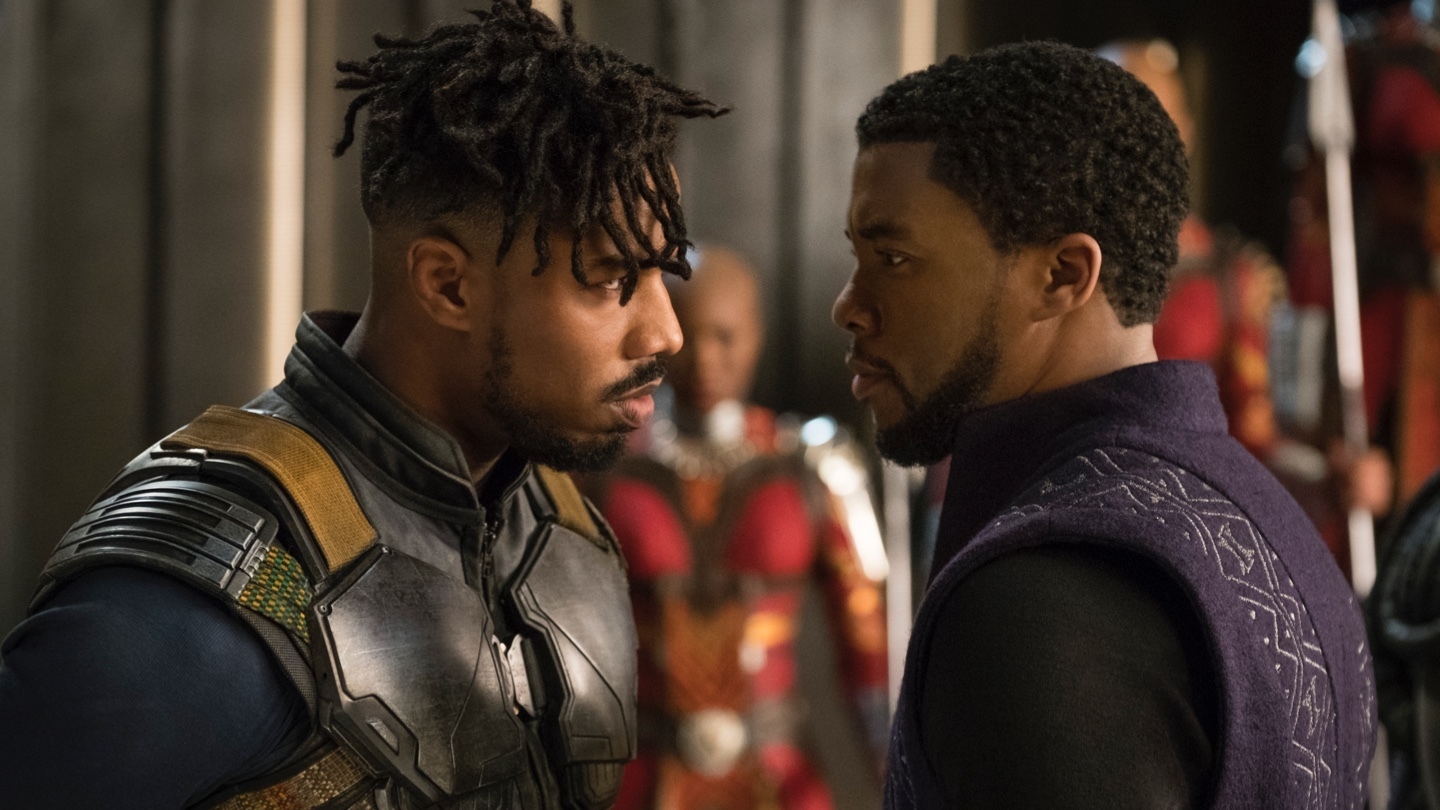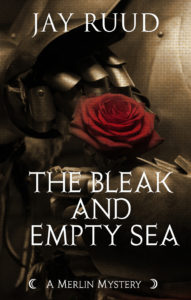Black Panther
Ryan Coogler (2018)
[av_image src=’http://jayruud.com/wp-content/uploads/2014/08/Shakespeare-180×180.jpg’ attachment=’76’ attachment_size=’square’ align=’left’ animation=’left-to-right’ link=” target=” styling=” caption=’yes’ font_size=” appearance=’on-hover’]
Ruud Rating
4 Shakespeares
[/av_image]
Chadwick Boseman has so convincingly made a career out of playing iconic African American figures—Jackie Robinson, James Brown, Thurgood Marshall—that it should come as no surprise that in Black Panther he transcends the iconic and enters the realm of the mythic. Boseman’s T’Challa, king of the (fictional) central African nation of Wakanda, who as reigning monarch also possesses the superhuman strength and abilities of the Black Panther, is mythic in two senses of the word: He is an exaggerated and idealized representative figure of the black people of the African continent and its diaspora, and he is a figure whose story embodies archetypal tropes, symbols, and patterns drawn from Karl Jung called the collective unconscious of the entire human race. This film appeals to viewers on their deepest level.
It is no fluke, then, that this past weekend Ryan Coogler’s new film of the Marvel superhero grossed more than $200 million. It was the largest opening for a film ever on Presidents’ Day weekend, the largest ever for any film released between January and April, and the fifth largest opening for any film ever. But not only are audiences flocking to see the film at a rate that should push it over the half-billion mark in earnings before its domestic run ends sometime in April, critics are just as enthusiastic about the film, recommending it at a level of 97 percent on the Rotten tomatoes.com Website.
It’s interesting to note the parallels between Coogler’s film for Marvel and last year’s hugely successful Wonder Woman in the DC comics universe. As the Wonder Woman character (played by Gal Gadot) was first cautiously introduced in a supporting role in a film that featured the surefire box office draws of Batman and Superman in Dawn of Justice and then went on to prove that a female superhero with a woman director (Patty Jenkins) could bring home a huge blockbuster superhero action movie, so the Black Panther character first appeared in the guaranteed megahit Captain America: Civil War in 2016 before exploding on the scene with his own film and demonstrating conclusively that a black superhero with an African American director (Coogler, who was previously known for Fruitville Station and Creed), can do precisely the same kind of thing.
The film opens as T’Challa returns home to assume the mantle of king in the wake of his father’s assassination. His home nation of Wakanda is in fact the world’s most technologically advanced country (due to their great deposits of a miraculous metal called vibranium). But Wakanda’s wonders are hidden from the rest of the world, for whom they masquerade as an impoverished third-world country, keeping their wealth and power a secret for the protection and development of their own people, and so as not to lose their traditional way of life. T’Challa takes on the role of king and Black Panther and, in a traditional ceremony to assume the kingship, must do battle with a challenger of royal blood in order to prove his worthiness to assume the role. We feel that he is indeed worthy—he is dignified, decisive and wise. But we sense there may be difficulties ahead: In a kind of mystical conversation with his deceased father T’Chaka (played by veteran South African actor John Kani) in a mythic meeting recalling Virgil and Dante, dear old Dad tells him “You are a good man, with a good heart…And it’s hard for a good man to be a king.”
In his new role, T’Challa is protected by a red-uniformed Praetorian guard of spear-wielding, shaved-headed women, led by the indomitable Okoye (Danai Gurira of TV’s The Walking Dead). His country also has an army headed by T’Challa’s close friend and Okoye’s romantic interest, W’Kabi (Daniel Kaluuya, currently Oscar nominated for his star-making role in last year’s Get Out!)
T’Challa is motivated by his father’s memory, but also by his love for Nakia (Oscar-winner Lupita Nyong’o from 12 Years a Slave). Nakia is a spy whom we first see on an undercover mission to rescue a group of captive Nigerian girls, and therefore she has some differences with T’Challa about how much the Wakandians should be doing to help oppressed people in the rest of Africa, a view shared by W’Kabi. This difference of opinion is similar to a more serious conflict that T’Challa’s father had with his late uncle N’Jobu (Sterling K. Brown of TV’s This Is Us). T’Challa’s relationship is much better with his own sibling, his sister Shuri (Letitia Wright, best known from TV’s Humans, in what for her could be a potentially star-making role). Shuri is a scientific genius who shows T’Challa a plethora of vibranium-based gadgets that put Q’s toys for James Bond to shame.
The conflict that sets the plot of the film going involves an old enemy of Wakanda, a South African smuggler and weapons dealer named Ulysses Klaue (Andy Serkis of Lord of the Rings and Planet of the Apes, in a rare non-CGI role). Klaue has resurfaced years after a terrorist-style theft of some Wakanda vibranium that happens to have killed W’Kabi’s father, and T’Challa leaves his throne to apprehend Klaue—a task that proves easier said than done as Klaue has weapons powered by stolen vibranium and is also assisted by a dangerous American black-ops veteran named Erik Killmonger (played by Coogler’s favorite actor, Michael B. Jordan, who starred in both Creed and Fruitville Station). It is Killmonger who becomes T’Challa’s chief antagonist, as he makes his way to Wakanda itself to challenge T’Challa for the throne.
His connections to the royal family surprise everyone in the capital, and his plans for Wakanda’s future are more in line with W’Kabi’s or Nakia’s, but with an added penchant for violence and thirst for personal power. With their closeness in age and kinship, T’Challa and Killmonger are literary doubles in this archetypal story, Killmonger serving as T’Challa’s other self, what he might become if he followed the paths that W’Kabi and Nakia would have him follow. After what becomes an archetypal descent and rebirth—similar to that other mythic character, Gandalf from Lord of the Rings—T’Challa returns, with greater resolve and self-understanding, to fight a final epic battle against Killmonger. That last might sound like a spoiler, but indeed this would not be a superhero movie without a final epic CGI enhanced battle of epic proportions.
What Black Panther does not do that other superhero movies do is pit the hero against some alien invaders or rival supervillains. Antagonists here are human, and the dangers not potential annihilation by invaders from outer space or another dimension, but human dangers of international conflicts and threatened race warfare, and this in itself ensures that the film is more immediately relevant than, say, Thor. Furthermore, this is a film in which black actors take center stage as both protagonists and antagonists, with the white actors relegated to the roles—of secondary villain (Serkis) or wisecracking sidekick (The Hobbit’s Martin Freeman as CIA agent Everett K. Ross)—traditionally given to African American actors in other superhero flicks.
Black Panther changes that dynamic. In doing so it becomes a showcase for a kind of who’s who of African and African diaspora actors, including the always welcome Forest Whitaker as the ceremonial elder Zuri (who has his own secrets) and veteran star Angela Bassett as T’Challa’s stately mother Ramonda. More importantly, Black Panther transcends the typical genre-movie by the characterization of Killmonger. Jordan’s swaggering presence nearly overshadows Boseman’s quieter, more earnest presence, and he also has legitimate grievances and understandable motivations that make him a fairly sympathetic villain—or would do so if we didn’t witness him performing a few unjustifiable acts.
Ultimately Black Panther is not just a rollicking good superhero adventure, it’s also an important movie in a number of ways. And it’s a well-made and well-acted film. I’m going to go ahead and give it four Shakespeares. Try and stop me!
NOW AVAILABLE:
If you like these reviews, you might enjoy Jay Ruud’s most recent novel, now available from the publisher at https://encirclepub.com/product/the-bleak-and-empty-sea/. Also available from Amazon or Barnes and Noble.
When word comes to Camelot that Sir Tristram has died in Brittany of wounds suffered in a skirmish, and that his longtime mistress, La Belle Isolde, Queen of Cornwall, has subsequently died herself of a broken heart, Queen Guinevere and her trusted lady Rosemounde immediately suspect that there is more to the story of the lovers’ deaths than they are being told. It is up to Merlin and his faithful assistant, Gildas of Cornwall, to find the truth behind the myths and half-truths surrounding these untimely deaths. By the time they are finally able to uncover the truth, Gildas and Merlin have lost one companion and are in danger of losing their own lives.
Order from Amazon here: https://www.amazon.com/Bleak-Empty-Sea-Tristram-Mystery/dp/1893035735/ref=sr_1_1?s=books&ie=UTF8&qid=1503328086&sr=1-1&keywords=Bleak+and+Empty+Sea
Order from Barnes and Noble here: https://www.barnesandnoble.com/w/the-bleak-and-empty-sea-jay-ruud/1126958139?ean=9781893035737


